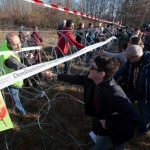First several migrants arrive in Croatia from Italy, according to the European plan for migration management.
The first four migrants from Italy arrived in Croatia in early Friday afternoon, in line with the European plan for the migration management. They will be accommodated in Zagreb, reports Večernji List on July 1, 2016.
In front of the reception centre, they were welcomed by Interior Minister Vlaho Orepić and head of the European Commission Representation in Croatia Branko Baričević. “Selam aleikum. Welcome to Croatia”, said Minister Orepić to migrants. He pointed out that Croatia was admitted to the European Union exactly three years ago and that it was now in a position to help people who were in trouble. “With this, Croatia demonstrates that it is a serious country and is carrying out its duties”, said Orepić, adding that this was only the beginning of the process.
Baričević expressed his satisfaction that, on behalf of the European Commission, he could congratulate the Croatian government and people for “opening their doors and hearts” to people who are experiencing tragedies similar to the ones which Croatia experienced 25 years ago. “Croatia has demonstrated that it is a member state which is mature and understands that the problem of migrants can be solved only if we approach it as a common problem”, said Baričević.
The arrival of the first group of migrants is a result of the activities on the transfer of migrants from Greece and Italy. One of the migrants, 27-year-old Abdul Rahman told reporters that he was happy that he came to Croatia and that he did not expect such a warm welcome. He said he hoped that he would find a good job as a driver and stay in Croatia until retirement.
In the meantime, the Welcome Initiative condemned on Friday the EU actions towards persons in need of protection and security, and expressed its concern about the inadequate level of preparedness of Croatian institutions for accommodating refugees. “The arrival of the first persons through the transfer system is taking place during a political crisis in Croatia. In such a situation, we cannot expect the adoption of the Action Plan for Integration, Operational Plan for Resettlement and Relocation, nor the Protocol for Integration because we believe that these strategically important documents must be adopted through a process that should involve consultations with the public”, said the Initiative.








